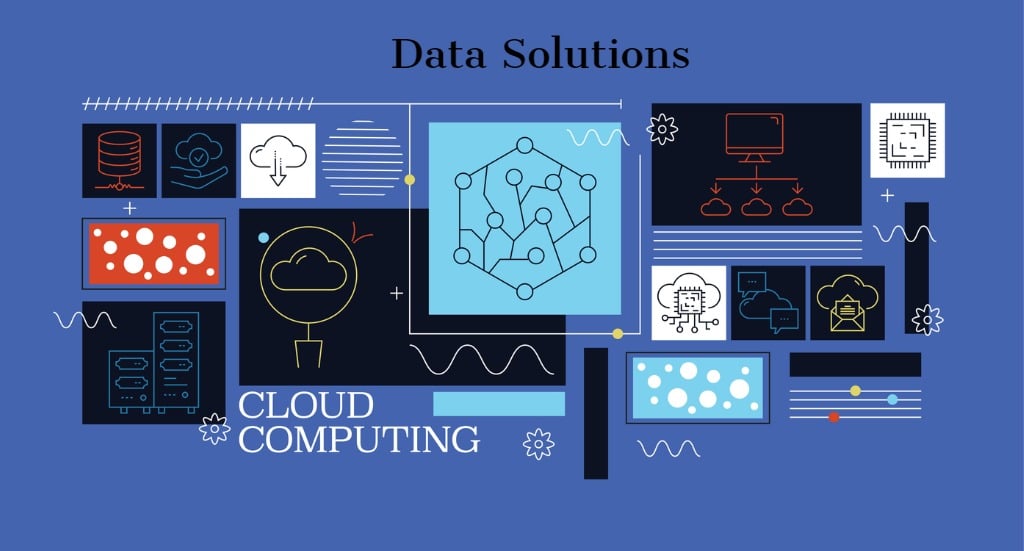
Introduction to Cloud Computing and Data
Cloud computing refers to storing and accessing data and applications over the internet instead of on a local server or personal computer. Its significance in the tech industry lies in its ability to provide scalable and flexible solutions, allowing businesses to adapt to changing needs quickly. With cloud-based data solutions, organisations can enjoy cost savings, increased data security, improved collaboration, and enhanced scalability. Embracing cloud computing can significantly streamline operations and drive innovation in the ever-evolving digital landscape. To learn more about the cloud, refer to Cloud Computing for Beginners.
Explanation of data management and its importance in business operations

Data management involves organising, storing, and retrieving data efficiently and securely. It plays a crucial role in business operations, ensuring data is accurate, accessible, and protected. Effective data management enables businesses to make informed decisions, improve customer experiences, optimise processes, and comply with regulations. By implementing robust data management practices, organisations can unlock valuable insights, streamline operations, mitigate risks, and gain a competitive advantage in today’s data-driven business landscape.
Top 10 Benefits of Implementing Cloud-Based Data Solutions

There are several key benefits to implementing cloud-based data solutions:
Scalability: Cloud-based data solutions offer the flexibility to scale storage and processing capabilities as needed, allowing businesses to handle growing data volumes without significant infrastructure investments.
Cost efficiency: By leveraging cloud services, organisations can avoid upfront hardware and maintenance costs associated with traditional data storage solutions, paying only for their resources.
Accessibility: Cloud-based data solutions enable seamless remote access to data from anywhere, facilitating collaboration and enhancing productivity for distributed teams.
Data security: Cloud providers employ robust security measures to safeguard data, including encryption, access controls, and regular backups, reducing the risk of data loss or unauthorised access.
Disaster recovery: Cloud-based data solutions offer automatic backup and recovery mechanisms, ensuring businesses can quickly restore data during a system failure or natural disaster.
Data integration: Cloud platforms provide tools and services to easily integrate data from various sources, enabling businesses to consolidate and analyse data from multiple systems or applications.
Advanced analytics: Cloud-based data solutions often offer built-in analytics capabilities, allowing organisations to gain valuable insights from their data and make data-driven decisions.
Increased agility: Cloud solutions provide rapid deployment and scalability, allowing businesses to quickly adapt to changing market conditions and seize new opportunities.
Regulatory compliance: Cloud providers often comply with industry-specific regulations and standards, relieving businesses of compliance burdens and ensuring data governance practices are in place.
Competitive advantage: By harnessing the power of cloud-based data solutions, organisations can gain a competitive edge by leveraging data-driven insights, improving customer experiences, and optimising business processes.
Implementing cloud-based data solutions can revolutionise how businesses manage and leverage their data, ultimately driving efficiency, innovation, and growth.
Critical Considerations for Implementing Cloud Data Solutions

When implementing cloud data solutions, there are critical considerations that businesses need to keep in mind:
Security: Ensuring data security is paramount when migrating data to the cloud. Robust security measures must be in place to protect sensitive information from unauthorised access or breaches.
Scalability: Cloud-based data solutions offer the advantage of scalability, allowing businesses to quickly expand their data storage and processing capabilities as their needs evolve. Choosing a cloud provider that can accommodate future growth and scalability requirements is essential.
Data Governance: Establishing clear policies and procedures is necessary to maintain data integrity, compliance, and privacy in the cloud environment. This includes defining roles, responsibilities, and data access controls.
Integration: Consideration should be given to how cloud data solutions will integrate with existing systems and applications within the organisation. Seamless integration ensures smooth data flows and optimal utilisation of resources.
By carefully addressing these critical considerations, businesses can successfully implement cloud data solutions and unlock the full potential of their data assets.
Use Cases and Examples of Cloud-based Data Solutions
Cloud-based data solutions have become fundamental to modern business operations, offering scalability, flexibility, and cost-efficiency. From data storage to advanced analytics, organisations across industries rely on these solutions to manage, analyse, and derive insights from their data. The table below outlines several critical use cases for cloud-based data solutions, specific examples, and the cloud services or platforms commonly associated with each use case. These examples illustrate how cloud technology enables organisations to harness the power of their data to drive innovation, improve decision-making, and enhance customer experiences.
| Use Case | Example | Cloud Services/Platforms |
|---|---|---|
| Data Storage and Backup | Storing and backing up data securely. | Amazon S3, Google Cloud Storage, Azure Blob Storage |
| Data Warehousing | Centralizing data for analytics. | Amazon Redshift, Google BigQuery, Snowflake |
| Real-time Data Streaming | Ingesting and processing streaming data. | AWS Kinesis, Azure Stream Analytics, Google Cloud Dataflow |
| Data Analytics and Machine Learning | Leveraging cloud resources for analytics and ML. | Azure Machine Learning, Google AI Platform, AWS SageMaker |
| IoT Data Management | Centralising data for analytics. | AWS IoT Core, Azure IoT Hub, Google Cloud IoT Core |
| Data Integration and ETL | Integrating, transforming, and loading data. | Google Cloud Dataflow, AWS Glue, Apache Nifi |
| Content Delivery and CDN | Efficiently delivering digital content. | Akamai, Amazon CloudFront, Azure CDN |
| Database as a Service (DBaaS) | Managing databases without infrastructure management. | Azure SQL Database, Amazon RDS, Google Cloud SQL |
| Data Security and Compliance | Ensuring data security and compliance. | Azure Key Vault, AWS Key Management Service (KMS), Google Cloud HSM |
| Data Collaboration and Sharing | Facilitating data collaboration and sharing. | Google Workspace, Microsoft 365, Dropbox Business |
| Data Catalog and Metadata Management | Cataloguing and managing metadata. | Collibra, AWS Glue Data Catalog, Azure Purview |
| Serverless Data Processing | Running serverless data processing tasks. | AWS Lambda, Azure Functions, Google Cloud Functions |
These use cases highlight how cloud-based data solutions empower organisations to efficiently manage their data assets, extract valuable insights, and drive innovation in today’s data-driven world.
Best Practices for Implementing Data Solutions
Best Practices for Implementing Data Solutions
Define clear objectives and requirements: Before implementing a cloud-based data solution, it is crucial to define the objectives and conditions of the project clearly. This will ensure the solution aligns with the organisation’s goals and addresses specific data management needs.
Conduct thorough research and evaluation: It is essential to conduct thorough research and evaluation of different cloud-based data solutions before deciding. This includes considering security, scalability, integration capabilities, and pricing models to select the solution that best suits the organisation’s needs.
Plan for data migration and integration: When implementing a cloud-based data solution, organisations should plan for the migration of existing data and ensure seamless integration with other systems or applications. Proper planning and execution will minimise disruptions and ensure data integrity.
Implement robust security measures: Data security is a top priority when implementing cloud-based data solutions. Organisations should implement strong security measures, such as data encryption, access controls, and regular security audits, to protect sensitive data from unauthorised access or breaches.
Training and support: Organisations should provide users with
comprehensive training and ongoing support to maximise the benefits of a cloud-based data solution. This will enable them to effectively utilise the solution’s features and functionalities, leading to increased productivity and successful implementation.
By following these best practices, organisations can successfully implement cloud-based data solutions and unlock the full potential of their data for improved decision-making, innovation, and enhanced customer experiences.
Conclusion
In conclusion, implementing cloud-based data solutions offers numerous benefits for organisations. By harnessing the power of cloud technology, businesses can efficiently manage their data assets, extract valuable insights, and drive innovation. This enables improved decision-making and enhanced customer experiences. By following best practices, organisations can fully unlock the potential of their data and maximise the advantages cloud-based data solutions offer.
In upcoming posts, I will start covering Microsoft Azure data solutions topics, starting with Azure SQL DB. Stay Tuned.

